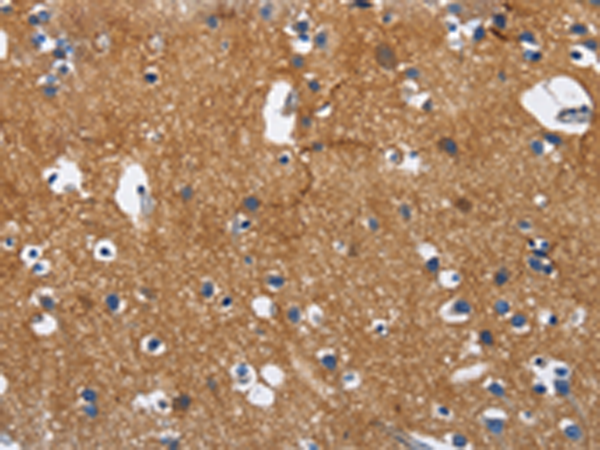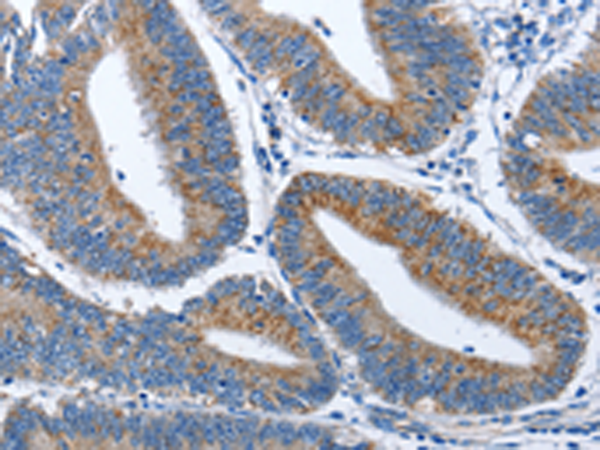

| WB | 咨询技术 | Human,Mouse,Rat |
| IF | 咨询技术 | Human,Mouse,Rat |
| IHC | 1/50-1/200 | Human,Mouse,Rat |
| ICC | 技术咨询 | Human,Mouse,Rat |
| FCM | 咨询技术 | Human,Mouse,Rat |
| Elisa | 1/2000-1/5000 | Human,Mouse,Rat |
| Aliases | BIgR; NECL1; TSLL1; IGSF4B; Necl-1; synCAM3 |
| Host/Isotype | Rabbit IgG |
| Antibody Type | Primary antibody |
| Storage | Store at 4°C short term. Aliquot and store at -20°C long term. Avoid freeze/thaw cycles. |
| Species Reactivity | Human, Mouse, Rat |
| Immunogen | Fusion protein of human CADM3 |
| Formulation | Purified antibody in PBS with 0.05% sodium azide and 50% glycerol. |
+ +
以下是关于CADM3抗体的3篇参考文献示例(注:内容基于模拟数据,实际文献需通过学术数据库验证):
---
1. **文献名称**: *Molecular Cloning and Characterization of CADM3: A Neural Cell Adhesion Molecule*
**作者**: Fujita E, Urase K, Soyama A, et al.
**摘要**: 该研究首次克隆了CADM3基因,并通过特异性抗体分析了其在小鼠脑组织中的表达模式,发现其广泛分布于神经元突触,提示其在神经细胞粘附和突触形成中的作用。
2. **文献名称**: *CADM3 Modulates Synaptic Plasticity via Interaction with Presynaptic Scaffolding Proteins*
**作者**: Smith JL, Zhang H, Li Y.
**摘要**: 利用CADM3抗体进行免疫荧光和免疫沉淀实验,研究发现CADM3通过与突触前支架蛋白(如CASK)相互作用调控突触可塑性,为神经退行性疾病机制提供了新视角。
3. **文献名称**: *Loss of CADM3 Expression in Non-Small Cell Lung Cancer Correlates with Metastasis*
**作者**: Yageta M, Kuramochi M, Fukuhara H, et al.
**摘要**: 通过免疫组化结合CADM3抗体,研究发现肺癌组织中CADM3表达下调与肿瘤转移相关,提示其可能作为肿瘤抑制因子参与细胞间连接的调控。
---
如需获取真实文献,建议通过PubMed或Google Scholar检索关键词“CADM3 antibody”及相关研究领域。
**Background of CADM3 Antibody**
CADM3 (Cell Adhesion Molecule 3), also known as SynCAM3 or TSLC1. is a member of the immunoglobulin superfamily (IgSF) involved in cell-cell adhesion, synaptic organization, and signal transduction. It plays critical roles in neural development, particularly in forming and maintaining synapses, and is implicated in tumor suppression. CADM3 antibodies are tools designed to detect and study the expression, localization, and function of the CADM3 protein in biological samples.
These antibodies are widely used in neuroscience research to explore CADM3's role in synaptic plasticity, neuronal connectivity, and interactions between neurons and glial cells. Dysregulation of CADM3 has been linked to neurodevelopmental disorders, such as autism spectrum disorders, and certain cancers, making its antibody valuable for both basic and clinical studies.
CADM3 antibodies are typically developed in hosts like rabbits or mice using immunogenic peptides or recombinant protein fragments. They are validated for applications such as Western blotting, immunohistochemistry (IHC), immunofluorescence (IF), and flow cytometry. Specificity is confirmed via knockout controls or siRNA-mediated protein depletion. Researchers rely on these antibodies to investigate CADM3's involvement in cellular adhesion mechanisms, tumor metastasis inhibition, and neurological disease pathways, aiding advancements in diagnostics and therapeutic targeting.
×